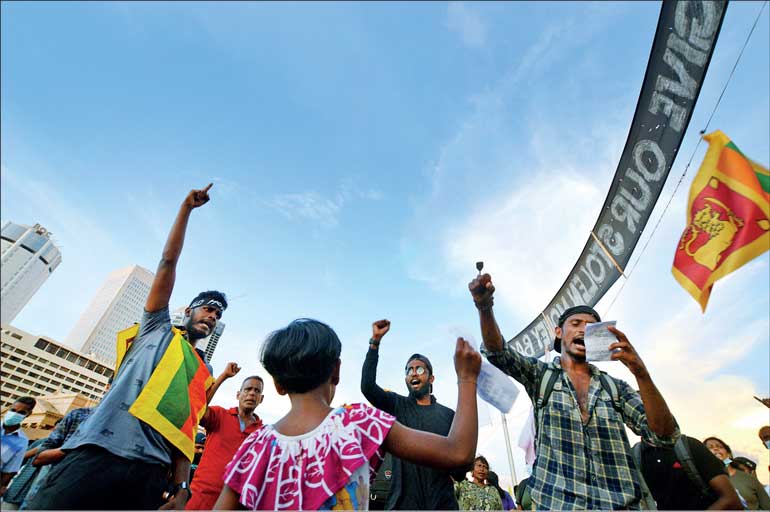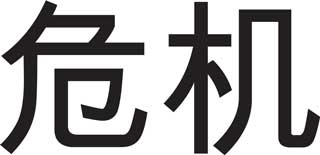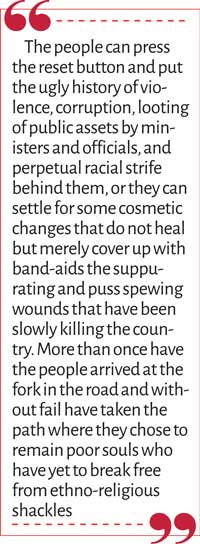Monday Feb 16, 2026
Monday Feb 16, 2026
Monday, 2 May 2022 00:09 - - {{hitsCtrl.values.hits}}

As the people of the country faint and die in lines waiting for kerosene or essential food items, hospitals run short of lifesaving medicines, and an innocent protester is shot dead while the rulers refuse to remove their noise-cancelling headphones, fingers of blame are being pointed at the 6.9 million
Two ideograms make up the Chinese word for ‘crisis’. The first means ‘danger’ while the other reads ‘opportunity’. The dangers convulsing the country are obvious to all, the opportunities the crisis presents less so. 
The people can press the reset button and put the ugly history of violence, corruption, looting of public assets by ministers and officials, and perpetual racial strife behind them, or they can settle for some cosmetic changes that do not heal but merely cover up with band-aids the suppurating and puss spewing wounds that have been slowly killing the country. More than once have the people arrived at the fork in the road and without fail have taken the path where they chose to remain poor souls who have yet to break free from ethno-religious shackles.
But if those in the young generation decide that the past of their parents need not be their future, they could claim like Frost that “two roads diverged in a wood and I (we) took the one less travelled by, and that has made all the difference.” But in order to make all the difference, this path will have to be paved with the essential materials.
If the proposed 21st Amendment is to be worth the paper (in short supply) it will be printed on, it should represent a complete reset on matters that have led to the present bankrupt and near failed state, teeming with despicable politicians and their cronies determined to betray the interests of the country to satisfy their own greedy power and money hungry agendas.
As the people of the country faint and die in lines waiting for kerosene or essential food items, hospitals run short of lifesaving medicines, and an innocent protester is shot dead while the rulers refuse to remove their noise-cancelling headphones, fingers of blame are being pointed at the 6.9 million.
If these had not bought into the triumphalist Kool Aid that promised “We will make this an exclusively Sinhala Buddhist country with its vistas of prosperity flowing with milk and honey and where minorities will finally know their place,” it is claimed, a woefully uneducated, uncultured and greedy clan would not have seized the ship of state only to steer it into the reefs of corruption and sectarian violence.
Blaming the 6.9 million ignores the tide of history. Barbara Walter, in her book ‘How Civil Wars Start’, draws our attention to the fact that ethnic and religious factionalism exists in almost every society. She writes that the most disposed to violence are the “sons of the soil”, who fume against their displacement by urban elites, especially by minorities. Ethnic entrepreneurs like Trump and his cheerleaders capitalised on this sentiment as did the advocates of Brexit, Marine le Pen in France, Viktor Orban in Hungary, and Modi in India. Stir in some religion and what the candidate has is a deadly poison that will kill the souls of humans but will be an elixir for the political fortunes of himself or herself.
So if 70 million in America voted for Trump, why blame the 6.9 million in Sri Lanka? Compared to claims by American televangelists such as Franklin Graham, the son of Billy Graham, that Trump, a patron of porn star-prostitutes, a serial liar, swindler and adulterer, is the Christian messiah or the Russian Orthodox Church bishops swooning over Putin and his massacres in Ukraine, a claim by a monk that the previous president is a lion, a civilisation, and a religion, seems distinctly understated. The added message from a senior monk that the country needs a Hitler without the faintest disapproval of the candidate exhorted to be Hitler would in effect guarantee a vote by the 69 lakhs who yearn to see the swamp drained. The 6.9 million should not be made scapegoats because the real culprits are hiding in plain sight.
Hiding in plain sight is the core group who should have known better. These are the professionals, businesspersons, intellectuals, paleo-conservative clergy, and right hand men and women close to and trusted by party leaders who could have spoken truth to power. Instead they chose to put their interests ahead of the country by literary abasing themselves, falling on their knees like slaves and worshipping the lord and master. In a culture that conflates respect with servility, they have made servility a high art. Public officers, who are servants of the people, appear to get an almost orgasmic thrill when grovelling before politicians in power.
It is this core group who could have prevented the slide into bankruptcy, both moral and financial, but chose instead to allow the puny men and women, the leaders of respective parties, to treat the Sri Lankan state as their personal fiefdom with the freedom to abuse every power of the state for their personal benefit.
When Sri Lankans, including a 14-year-old child, were protesting peacefully for clean water in Rathupaswela and were clubbed more mercilessly than the seal pups in Canada, Maya Angelou’s advice that, “When people show you who they are, believe them the first time,” should have been heeded. The people and the core group were not shown once but multiple times, in a snarling BBC interview and in the expletive laden conversation with Frederica Janz, but chose instead reckless credulity over belief of facts staring them in the face. Had they only cried “Halt!” Had they not behaved like invertebrates but in personal meetings had warned, “We cannot support you any longer if you do this”, they could have stopped the mutilation of State institutions and looting of State property by assorted political party leaders and their crony parasites.
Had they not behaved like invertebrates but in personal meetings had warned, “We cannot support you any longer if you do this”, they could have stopped the mutilation of State institutions and looting of State property by assorted political party leaders and their crony parasites.
But this never happened and the tectonic shift necessary to change the three monkeys approach embedded in the country’s culture will not happen. Because of this it is necessary to ensure that the fate of the sovereignty proclaimed in Article 3 of the Constitution is not entrusted to the decency of politicians. Only institutions, like an independent judiciary, and a non-political head of state can be relied upon to safeguard the ‘grundnorm’ of the Sri Lankan state like the precious jewel that it is. This is something that the proposed 21st Amendment must secure. If there is to be a decent future for the country’s young, a reset button with far-reaching consequences must be activated. Anything less and the country will suffer the same fate of the X-press Pearl and will be “bound in shallows and in miseries”.
Pressing the reset button would require several changes. Some of these are discussed below, others will be discussed in future op-eds.
1) Abolition of the Executive Presidency
Article 4.b should be amended so that the executive powers of the People shall be exercised be a cabinet of ministers who shall be collectively responsible to Parliament and to the People.
A reputed constitutional lawyer has persuasively argued that no referendum would be required in order to abolish the executive presidency if done by a constitutional amendment. Even if the courts should hold that a referendum will be required, all parties should support an affirmative vote in the referendum.
Successive presidents and some judges operate on the unspoken assumption that Thailand’s lèse-majesté law and Pakistan’s anti-blasphemy law have been imported into the constitution and apply not to a monarch or to Islam but to the president and the judiciary. The 21st A must shatter into smithereens these delusions of grandeur.
2) Restoration of Non-Executive Presidency as Head of State
The first republican constitution contains a working template to identity the powers and duties of a non-executive president. However, a passive president who does what she’s told to do by the prime minister as in the Westminster model will be of little use. The current semi-presidentialist model must be abolished but the head of state must be the repository of certain powers that curb the all too familiar abuses such as procurement corruption, violence by state agents and the unequal or discriminatory enforcement of laws.
To be equipped to do his job, the president must, in addition to a presidential secretariat, be the head of an Office of Public Integrity (“OPI”). The OPI will be responsible for ensuring the anti-nepotism provision, that will be recommended in the next op-ed, is followed, that state property is safeguarded, and that there are free and transparent procurement procedures. OPI staff would also have monitoring positions in the auditor-general’s department as well as in any government procurement body with the right to veto any unsolicited bid.
Unlike in the first republican constitution, the president should be elected by a vote in parliament with at least one half of the opposition voting in favour. To be eligible, the candidate must have not been in active politics for at least 10 years preceding the vote, a professional, and a person in good standing in his profession. The president will be assisted by two vice-presidents, one of whom shall be a woman, and be members of two different ethnic communities excluding the ethnic community of which the president is a member. None of the above individuals may be eligible for reappointment or the holding of government office for a period of ten years following their leaving office.
All of the above officers may be removed by an address of Parliament with at least half of the opposition present and supporting the removal.
Only those with short memories will forget how a public servant, the brother of the then executive president, commanded the service chiefs of the armed forces to be present in court during a private defamation case. The Opposition, as may be expected, dared not question in Parliament how the service commanders be ordered to waste public money by being asked to “support” a fellow government employee, albeit a sibling of the then president, in a private litigation. A commander in chief who is a titular president will not allow such a criminal misappropriation of public funds and the degradation of service personnel.
Few would be credulous enough to believe that the shocking pardons of convicted killers granted by the present and previous president complied with Article 34(1)(d) of the Constitution which provides in detail the conditions for a valid pardon of convicted murderers. The pardons power should be entrusted to the titular president with the vice presidents signing a declaration that the procedures for extending pardons have been satisfied.
3) Upgrading the quality of the judiciary and abolition of contempt of court power re scandalising the judiciary
From the Bracegirdle Case through the acquittal of Theja Gunawardana, tried for criminal defamation, the reputation of the judiciary for being a jealous guardian of the rule of law had been secure. Unfortunately, many now express concern about the capacity of the judiciary to deliver the same quality of justice as earlier benches. Strengthening the capacity and ethics of the judiciary should be a front burner issue for the 21st Amendment. A respected and capable judiciary can do much to protect the sovereignty of the People. Apart from a code of judicial ethics, such as the Bangalore or Mount Scopus principles, being included in the 21st Amendment, an overhaul of the contempt law referred to in Article 105(3) is also essential.
If any judge really believes that the raison d’être for the law of contempt relating to scandalising the judiciary continues to exist and convicts an individual, she must explain in her judgment how a public can have faith in a judiciary after being told by the previous president that the then chief justice begged him to be retained in exchange for delivering judgments in favour of that president. Continuing to apply such law and punish people under this law cannot be justified at this time of the country’s history.
A radical but urgently required change is for a final court of appeal composed both of local and distinguished foreign judges. The quality of the local judiciary is highly uneven and in order to restore the quality of the judiciary to previous post-independence levels, where the Privy Council was the apex court, will be a difficult if not impossible task for well-known reasons. The Hong Kong model of an appeals court with judges from other countries has much to be commended. Even Singapore which has one of the most qualified courts in the world has adopted the Hong Kong system for commercial matters.
If one critically reads the Supreme Court determinations on the various draft constitutional amendments, one can react only with despair. Examples of poor analysis and a gingerly grasp of basic legal concepts are legion, so just one example must suffice.
Every law student should know much of what is to be known about the concept of ‘justiciability’. It’s a portmanteau term encompassing a number of different legal principles. For present purposes, when asking whether something is justiciable, one has to ask whether a given question can be determined by the court by applying legal standards. Justiciability goes to the essence of the judicial function. In layman’s terms it means that there are some matters that are capable of being adjudicated because they involve the application of settled law. Other matters that cannot be settled by the application of legal norm are regarded as non-justiciable and the courts do not, or at least should not, touch these cases.
Consider the court’s treatment of the jurisdiction to try impeachment cases imposed on it by the 20th Amendment. Article 38(2)(a) refers to ‘treason’ (used before the 20th Amendment) and ”misconduct or corruption involving the abuse of power of his office.” Article 38(2)(c) requires the Supreme Court to determine if an impeached president is guilty of such conduct. Apart from the fact that the Penal Code does not has an offence described as ‘treason’, the Supreme Court has no standards to determine if there has been ‘misconduct involving abuse of power’. Most courts would have declined to sustain these provisions because the questions presented are obviously non-justiciable but the Supreme Court in a baffling oversight let stand these provisions. The bench should have reprimanded in severe terms the persons, yet to be identified, who call themselves lawyers, who drafted the nonsensical 20th Amendment. Instead, it allowed itself into permitting the Supreme Court to be dragged into non-justiciable adjudication, an oxymoron.
Impeachment is a political process. Officials may be impeached for alleged offences as well as for wrongdoing not illegal but so egregious so as to disqualify the official from continuing in office. Courts are simply not able to decide on the latter type of impeachable ‘offences’. In no other country are impeachment proceedings conducted in the form of a judicial trial by judges applying the law. Only inexcusable ignorance of and a lack of curiosity about comparative constitutional law can explain the error in green-lighting the sub-articles in Article 38.
The proposed 21st Amendment should also complete abolish that part of the contempt of court law known as ‘Scandalising the judiciary’ under which a parliamentarian was convicted and who is presently serving a custodial sentence. There are several practical and normative reasons for this repeal.
The historical justification for this body of law is the societal need for public confidence in the integrity of judges. A public who have such faith will not resort to Hobbesian self-help remedies. The law is certainly not there to protect the injured feelings of judges. To be justified, this law should be based on the credible belief that the Sri Lankan public has confidence in our judges, as massive an error as believing that the earth is flat.
Consider the case of a chief justice allegedly found committing an act of public indecency with a married lawyer in the Parliament car park. In his defence, it could be said that he was merely dramatising, perhaps a tad too graphically, what those in a nearby chamber regularly do to the people who sent them there. But what is less excusable is his public statements that hinted, if not actually said, that had he not put a heavy hand on the scales of justice, a future president would be behind bars for embezzling tsunami funds. One of the bas reliefs on Angkor Wat shows a Chinese trader putting his thumb on the scale and cheating a poor Khmer villager. It is a sad day for the judiciary when the cheating Chinese trader and a chief justice of Sri Lanka share the same ethics.
Lest it be thought that there is an unfair focus on the shenanigans of this individual, it should be said that his behaviour, as amply documented by a prominent journalist, can supply materials for a casebook on judicial corruption. He paved the way for subsequent misconduct like a successor feting the newly sworn-in first son as an advocate with a tea party! Princess Punctuality saved the chief justice from being impeached by proroguing Parliament only to meet her Et tu Bruté moment when the man who administered the oath of office to her trimmed her term in a case presided over by him. Not for him the unanimous House of Lords decision in the Pinochet case about mandatory recusal because of a conflict of interest.
As for the tea-hosting chief justice, now trying to pose as a paragon of judicial probity whose ape miniha husband was handed a lucrative position in the insurance corporation by the father of the first son, she too experienced a “karma is a bitch” moment when she was chased out pursuant to a hysterical impeachment orchestrated by her former hero. Likewise, the arrest of an ex-judge for sexual assault of a maid supposedly committed when he was on the Supreme Court bench does nothing for the reputation of the judiciary which is protected by the present contemptible law of contempt.
Because the Supreme Court has so far not adopted a judicial code of ethics such as the Bangalore Code or the Mount Scopus Code, the amendment should incorporate either code as setting mandatory rules of judicial ethics.
In the days of vibrant social media, trying to silence critics of judges, the judiciary, and the judicial system is as effective as King Canute commanding the waves to cease. Prominently featured in these posts is a character called ‘Pissu Poosa’ who is accused of having being promoted to the highest reaches of the judiciary not on merit nor integrity but solely because of the favours rendered to the thespian chief justice in the latter’s divorce case. No judicial contempt order could punish such online posts.
Judges and students in the common law world are familiar with the figure of Lord Atkin, the author of the seminar snail in the ginger beer (Not, EGB) bottle case that is the foundation of the law of negligence. The same Lord Atkin famously observed that “Justice is not a cloistered virtue. She must be allowed to suffer the scrutiny and respectful, even though outspoken, comments of ordinary men.” Only Wahabi jurisprudence can clothe justice in an abaya as in present day Sri Lanka. In the Gina Miller initiated Brexit Case, the English tabloid, the Daily Mirror, pasted pictures of the Chief Justice, the Master of Rolls, and another senior judge under heading ‘Enemies of the People’. Even in the notorious libel tourism friendly jurisdiction of England, nothing could be done. And that is the way it should be in Sri Lanka.
The taproot of scandalising the judiciary law lies in English history where respect for the King’s judges was essential for the maintenance of the king’s writ throughout the real. Those historical justifications do not apply in modern Sri Lanka. Judges must wake up to the fact that the sovereignty of the country lies with the People. The observation of Wanasundera J. in Hewanananne v De Silva that:
‘The power vested In the – Judges to safeguard the
welfare and the security of the people is also a
delegated part of the sovereignty of the People,
referred to in Articles 3 and 4 of the Constitution.
Contempt against the judges – is therefore an insult
offered to the authority of the People and their
Constitution...”
would be risible if it had been made after some of the events mentioned above. Arguably, he would not have made them had he known how the reputation of the judiciary would degenerate into public scorn. For an open society, the observations of another giant of the common law, Lord Denning in R. Vs. Commr. of Police is far more acceptable and rational: “Let me say at once that we will never use this jurisdiction to uphold our own dignity. That must rest on surer foundations. Nor will we use it to suppress those who speak against us. We do not fear criticism, nor do we resent it. For there is something far more important at stake. It is no less than freedom of speech itself…All that we ask is that those who criticise us should remember that, from the nature of our duties, we cannot reply to their criticism. We cannot enter into public controversy. We must rely on our conduct itself to be its own vindication”.
And if that conduct involves public indecency, sexual assault against maids, and blatant disregard of judicial ethics, the Latin chestnut, “res ipsa loquitur” comes into play.
In a free and open society, the right to observe, indeed shout from every rooftop, that the emperor is naked is a right not confined to innocent children but to all citizens exercising their sovereignty under Article 3 of the Constitution.
From the time of Bracegirdle, the judiciary has had a history of upholding the rule of law, a history that has been marred by allegations of judicial subservience, in violation of a solemn oath to do justice without fear or favour, in order to win promotions to the Supreme Court or promotions within the court. This is a crying shame and brings to mind a passage in Robert Bolt’s play, ‘A Man for All Seasons’. More speaks to his daughter as follows: “When a man takes an oath, Meg, he’s holding his own self in his own hands. Like water. (He cups his hands) And if he opens his fingers then – he needn’t hope to find himself again.”
How many who have served in the judiciary and in the legal profession can say that they haven’t open their fingers and allowed their integrity and self-respect to drain into the sewer?